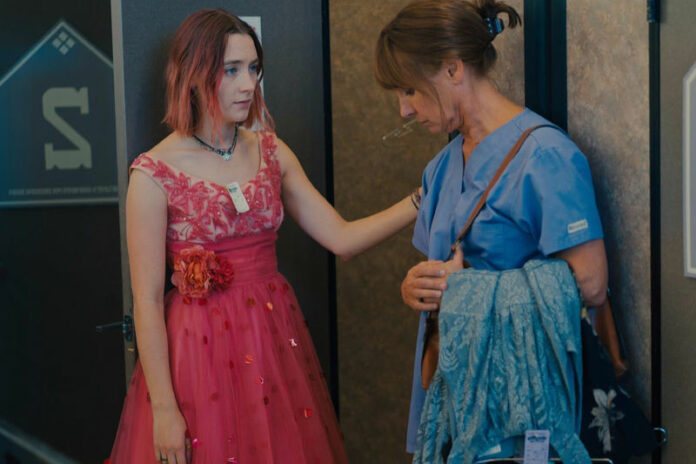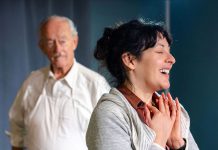Opening with Joan Didion’s quote: “Anyone who talks about California hedonism has never spent a Christmas in Sacramento.” writer/director Greta Gerwig’s coming-of-age movie, Lady Bird, proves that the universality of high school angst can be fresh, alive and exciting. The title is the self-chosen nick-name of a Sacramento teen (2-time Oscar nominee Saoirse Ronan) attending an all girls Catholic high school in 2002. As her overly critical mother (2-time Emmy and Tony Award-winner Laurie Metcalf) keeps reminding her, they can’t really afford the private school tuition, but are forced to because her older brother, Miguel (Jordan Rodrigues), “saw a knifing right in front of him” at the public school.
We are introduced to the mother/daughter dynamics as they drive home from visiting colleges. Lady Bird has reached that milestone in Senior year where she is just marking time until she can break free—from her family, her home, her parochial education, and most of all, Sacramento and all it represents. The mom’s litany of put-downs and undercuts finally become too much, so Lady Bird opens the passenger door, rolls out onto the highway, and breaks her arm.
Longing to escape to New York City, Lady Bird follows the lead of her overweight and perpetually sunny Best-Friend Julie (Beanie Feldstein), and signs up for a school musical performance with students from both the girls and boys Catholic schools. She develops an experimental crush on another performer, Danny (Oscar-nominee Lucas Hedges), and when they are stargazing, her not-to-subtle suggestion that he can touch her breasts is met with a disappointing “I respect you too much to do that” response.
Expanding her circle of friends to include Jenna (Odeya Rush), the “perfect” girl Julie and Lady Bird used to mock about having a tanning bed in her home, and a moody drummer named Kyle (Timothee Chalamet). who soon becomes boyfriend #2. Problem is, to fit these new “friends” into her life, Lady Bird decides to leave Julie in the dust.
Unlike most teen movies, parents are critical to the gestalt that is Lady Bird (both the character and the film). The dad (Tracy Letts), is the supportive parent—the one who encourages his daughter to apply to schools in New York even if they will be more expensive to attend than ones close by. Unfortunately, Dad loses his job part-way into the film, and raises the mother’s level of criticism and fear to an even higher pitch.
There is little doubt that Lady Bird has autobiographical components drawn from Greta Gerwig’s own Sacramento Catholic girl’s school experiences. The refreshing thing is how positively she incorporates these events. For example, the Catholic High School teachers and staff offer help and guidance to Lady Bird, and come across as real human beings instead of stereotypes. Father Leviatch (Stephen Henderson) is the avuncular director of the school musical who unexpectedly starts crying and can’t stop during a rehearsal, and when school counselor, Sister Sarah Joan (Lois Smith) reads Lady Bird’s college entrance essay she not only points out how well the girl writes, but also how much she obviously loves Sacramento. “I just notice things,” Lady Bird responds with surprise. “Isn’t noticing an important part of loving?” asks Sister Sarah Joan.
There are numerous examples I could cite — miniature masterpieces in a movie filled with astoundingly well-crafted performances. Instead, I encourage you to experience this film yourself. Greta Gerwig’s Lady Bird is a winner!
Comments? E-mail gi*********@*****st.net









